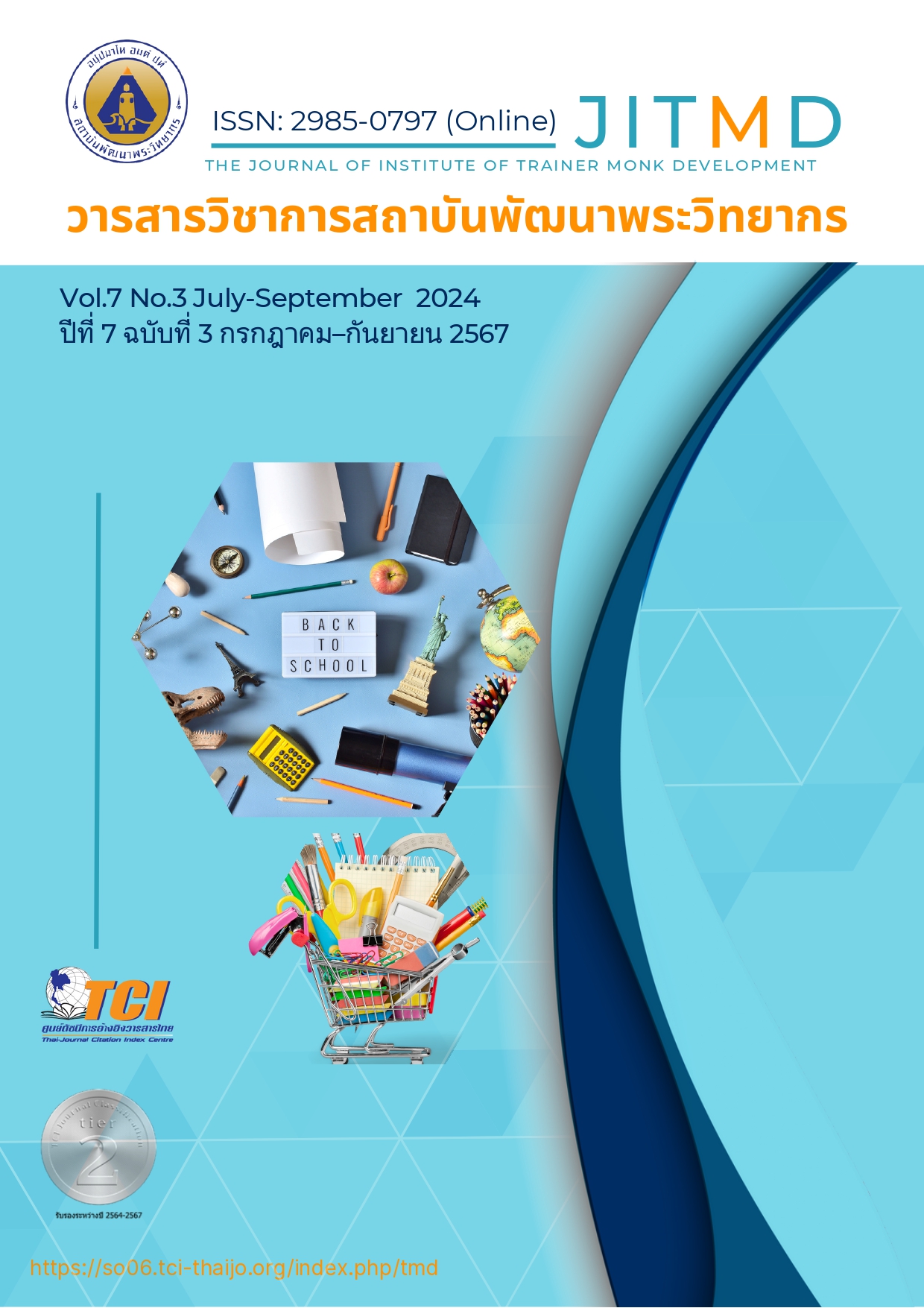The Buddha: A Role Model for Mastery in Coaching
Main Article Content
Abstract
This article aims to present the concept of coaching as it appears in the Buddhist scriptures, using relevant literature and research. The findings reveal that the definitions, philosophies, characteristics, qualities, and examples of coaching are already embedded within Buddhism. Despite the current ambiguity and confusion surrounding the definition of coaching-which has led the International Coaching Federation (ICF), recognized as the largest professional coaching organization in the world; to propose a standardized definition, this study highlights the parallels between Western approaches to mental and emotional care and those found in Buddhism. However, this article focuses on the concrete examples that have been systematically documented, emphasizing on the goal of helping the Coachee (the person recieving coaching) transcend suffering and achieve true happiness. This process relies on the Coach (service provider), who embodies wisdom, purity, and compassion, facilitating the Coachee's growth and leading to outcomes that extend beyond visible benefits into intangible advantages. Such individuals are not only able to reach their full potential but can also transform into disciples of the Buddha, spreading peace and happiness to those around them as agents of change. As a result, The Buddha is portrayed as the perfect model of Mastery, the highest level of coaching), providing both personal fulfillment and the capacity to benefit others, who in turn support and uplift their communities, creating a peaceful and harmonious society. In light of this, the Buddha can be seen as the ultimate role model for modern professional coaches, both within the context of Buddhism and in the broader global coaching practice.
Article Details

This work is licensed under a Creative Commons Attribution-NonCommercial-NoDerivatives 4.0 International License.
บทความที่ได้รับการตีพิมพ์เป็นลิขสิทธิ์ของวารสารวิชาการสถาบันพัฒนาพระวิทยากร
ข้อความที่ปรากฎอยู่ในบทความที่ได้รับการตีพิมพ์ในวารสาร ถือเป็นความรับผิดชอบของผู้เขียนบทความ และข้อคิดเห็นนั้นไม่ถือว่าเป็นทัศนะและความรับผิดชอบของกองบรรณาธิการวารสารวิชาการสถาบันพัฒนาพระวิทยากร
References
กิตติชัย งามชัยพิสิฐ. (2566). ฟาสามัญ: คู่มือกระบวนการกลุ่มเพื่อขับเคลื่อนสู่ความเป็นธรรม. กรุงเทพมหานคร: มูลนิธิความร่วมมือสันติภาพ.
คณาจารย์ มหาวิทยาลัยมหาจุฬาลงกรณราชวิทยาลัย. (2559). พุทธวิธีการสอน. (พิมพ์ครั้งที่ 2). พระนครศรีอยุธยา: สำนักพิมพ์มหาวิทยาลัยมหาจุฬาลงกรณราชวิทยาลัย.
เทอดทูน ไทศรีวิชัย และวรภัทร์ ภู่เจริญ. (2565). หัวใจแห่งการโค้ช. กรุงเทพมหานคร: อินเตอร์เนชั่นแนล โค้ชชิ่ง มาสเตอรี่.
ปกรณ์ วงศ์รัตนพิบูลย์. (2560). โลกของการโค้ช. กรุงเทพมหานคร: เอ็ดดูเคชั่น ไมนด์ ไลน์ มัลติมีเดีย.
พระพรหมคุณาภรณ์ (ป.อ. ปยุตฺโต). (2546). พจนานุกรมพุทธศาสน์ ฉบับประมวลศัพท์. กรุงเทพมหานคร: มหาวิทยาลัยมหาจุฬาลงกรณราชวิทยาลัย.
พระพรหมบัณฑิต. (2561). พระไตรปิฎกฉบับสากล: วิถีธรรมจากพุทธปัญญา. พระนครศรีอยุธยา: มหาวิทยาลัยมหาจุฬาลงกรณราชวิทยาลัย.
พระมหาขวัญชัย กิตฺติเมธี. (2560). มนุษย์ต้องการศาสนา หรือ ศาสนาต้องการมนุษย์ บทวิเคราะห์ว่าด้วยศรัทธา และปัญหาในพระพุทธศาสนาเถรวาท. วารสารวนัมฎองแหรกพุทธศาสตรปริทรรศน์, 4(1): 99-105.
พระมหาโพธิวงศาจารย์ (ทองดี สุรเตโช). (2559). พจนานุกรม ไทย-บาลี. กรุงเทพมหานคร: วัดราชโอรสารามราชวรวิหาร.
พระวุทธ สุเมโธ (ทองมั่น). (2566). รูปแบบการโค้ชเพื่อสันติภาพสำหรับพระนักเผยแผ่ในสังคมไทย. ดุษฎีนิพนธ์พุทธศาสตรดุษฎีบัณฑิต. บัณฑิตวิทยาลัย: มหาวิทยาลัยมหาจุฬาลงกรณราชวิทยาลัย.
ไพทูรย์ สงค์แก้ว. (2563). ประโยชน์ของสมาธิที่วิทยาศาสตร์ได้วิจัยแล้ว. นนทบุรี: เบญจนิกายมูลนิธิ.
มหาจุฬาลงกรณราชวิทยาลัย. (2539). พระไตรปิฎกภาษาไทย ฉบับมหาจุฬาลงกรณราชวิทยาลัยกรุงเทพมหานคร: โรงพิมพ์มหาจุฬาลงกรณราชวิทยาลัย.
ราช รามัญ. (2560). โค้ชวิถีพุทธ. กรุงเทพมหานคร: สำนักพิมพ์ปราชญ์.
วันชัย วัฒนศัพท์ และภัทรวุฒิ วัฒนศัพท์. (2561). ผู้นำการเปลี่ยนแปลง: คู่มือและเครื่องมือการพัฒนาด้วย กระบวนการสุนทรียปรัศนีและการสื่อสารอย่างสร้างสรรค์สู่สันติธรรม. ขอนแก่น: โรงพิมพ์คลังนานาวิทยา.
วุฒินันท์ กันทะเตียน. (2562). แก่นสาธารณสงเคราะห์ในคัมภีร์พุทธ. นนทบุรี: นิติธรรมการพิมพ์.
สมเด็จพระพุทธโฆษาจารย์ (ป.อ. ปยุตฺโต). (2562). พุทธวิธีในการสอน. (พิมพ์ครั้งที่ 25). กรุงเทพมหานคร: บริษัท โอ.เอส. พริ้นติ้ง เฮ้าส์ จำกัด.
โสรีช์ โพธิแก้ว. (2553). จากจิตวิทยาสู่พุทธธรรม. นครปฐม: ศูนย์จิตตปัญญาศึกษา มหาวิทยาลัยมหิดล.
ICF Philadelphia. (2024). What Is Coaching. Retrieved [14 February 2024] from https://icfphiladelphia.wildapricot.org/What-is-Coaching.
International Coaching Federation. (2024). Code of Ethics. Retrieved [14 February 2024] from https://coachingfederation.org/ethics/code-of-ethics.
International Coaching Federation. (2024). Leading the Advancement of Coaching. Retrieved [14 February 2024] from https://coachingfederation.org/about.
Kelly Miller. (2020). Coaching Philosophy: What It Is and How to Develop Your Own. Retrieved [14 February 2024] from https://positivepsychology.com/coaching-philosophy.
Online Etymology Dictionary. (2024). Coach. Retrieved [14 February 2024] from https://www.etymonline.com/word/coach.


